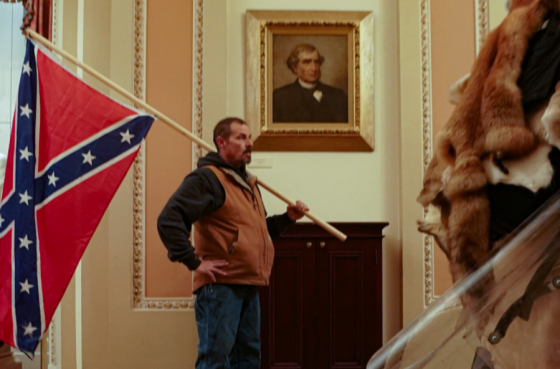Thoughts on the Tragedy at the Capitol
What would Jesus do now? That’s a hard question.
As a professional historian, I search for an analogy that explains the sacking of the Capitol building. The Bastille? Hitler’s Beer Hall Putsch and the Reichstag Fire? Mussolini’s March on Rome?
In truth, political violence has always been part of the American story. In 1834 a nativist mob burned a Catholic convent in Boston. In the 1850s in Altoona and Christiana, PA, free blacks used extra-legal means to rescue runaways. The portrait of abolitionist Senator Charles Sumner, who was nearly beaten to death on the Senate floor, hangs just behind the Confederate-flag-bearing rioter whose image went viral. John Brown raided the federal arsenal at Harper’s Ferry, seeking weapons to arm a slave insurrection. In Tennessee, Samuel Garber, a Brethren minister, preached against slavery. He was arrested, and when released on bail, fled for his life. After the Civil War, white supremacists massacred a black militia in Colfax, LA.
But the recent attack on Congress is unique for its target and fundamental disruption of the democratic process. For a few hours, the putsch-makers seized power, which is different from anything in our past. How should Brethren who seek peace and justice respond?
Cliches about a big kumbaya moment ring naive, and laments of can’t-we-all-come-together are out of touch with reality. How do we dialog with those who believe that the government is awash in Satanic pedophiles and who rampage through the legislative building with zip-ties? Even Mohandas Gandhi and Martin Luther King, Jr., learned that some are immune to dialogue. Meaningful conversation with the KKK, for example, was a non-starter for King.
But, on the other hand, those of good faith can accomplish much. When small-d democrats unite, they isolate the unpersuadable and irreconcilable. In the Sixties the American mainstream coalesced, with significant support from the religious community, to enact the Civil Rights Act and the Voting Rights Act.
Jesus also instructs. He also knew that sometimes can’t-we-all-come-together was off the table, and in those situations, he told his followers to shake the dust from their feet. But he dined with tax collectors. Apparently, civility prevailed in these encounters, the tax collectors were rational, and some were persuadable (Zacchaeus).
Good people, then, need to take a page from King and Jesus. Put aside disputes over ordinations and the finer points of the First Amendment on religious freedom. For the moment, we have bigger fish to fry. If you absolutely need to argue over the culture wars, can you at least wait until everybody is vaccinated?
The stakes are very high now. Everybody knows how the antebellum sectional dispute worked out, but we don’t have to plunge off the same cliff. Human agency is powerful. In conversion, I am hard-core free will. “Come to Jesus” means exactly that; humans have the ability.
Use that individual capacity to step up, put aside old arguments, and join hands to quarantine would-be rioters. Witness for peace, justice, and democracy.











